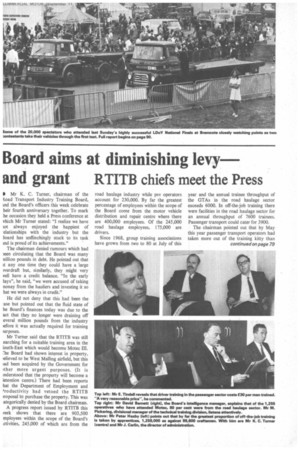Board aims at diminishing levy
Page 75

Page 77

If you've noticed an error in this article please click here to report it so we can fix it.
and grant RTITB chiefs meet the Press Mr K. C. Turner, chairman of the toad Transport Industry Training Board, tad the Board's officers this week celebrate heir fourth anniversary together. To mark he occasion they held a Press conference at which Mr Turner stated: "I realize we have iot always enjoyed the happiest of .elationships with the industry but the 3oard has unflinchingly stuck to its task Ind is proud of its achievements."
The chairman denied rumours which had )een circulating that the Board was many nillion pounds in debt. He pointed out that It any one time they could have a large werdraft but, similarly, they might very well have a credit balance. "In the early lays", he said, "we were accused of taking noney from the hauliers and investing it so hat we were always in credit."
He did not deny that this had been the :ase but pointed out that the fluid state of he Board's finances today was due to the act that they no longer were draining off everal million pounds from the industry )efore it was actually required for training iurposes.
Mr Turner said that the RTITB was still earching for a suitable training area in the lout h-East which would become Motec rhe Board had shown interest in property, 'chewed to be West Mailing airfield, but this tad been acquired by the Government for )ther more urgent purposes. (It is aiderstood that the property will become a letention centre.) There had been reports hat the Department of Employment and )roductivity had vetoed the RTITB proposal to purchase the property. This was ategorically denied by the Board chairman.
A progress report issued by RT1TB this veek shows that there are 903,500 mployees within the scope of the Board's .ctivities, 245,000 of which are from the road haulage industry while psv operators account for 230,000. By far the greatest percentage of employees within the scope of the Board come from the motor vehicle distribution and repair centre where there are 400,000 employees. Of the 245,000 road haulage employees, 175,000 are drivers.
Since 1968, group training associations have grown from two to 80 at July of this year and the annual trainee throughput of the GTAs in the road haulage sector exceeds 6000. In off-the-job training there were facilities in the road haulage sector for an annual throughput of 7600 trainees. Passenger transport could cater for 3900.
The chairman pointed out that by May this year passenger transport operators had taken more out of the training kitty than hey had contributed—£1 l4-m • in grant igainst film in levy. He suggested that the tw levy system would alter"this imbalance".
Road haulage operators will be pleased to :am that the Board is looking ahead to the lay when, as Mr Turner put it: "We shall el to a situation when the levy will diminish .nd the grant will go with it." • It is the Board's intention to concentrate • efforts on programmed training to meet
he specific needs of companies. -In our first tar, we were obsessed with quantity," said he director-general, Mr E. Tindall. "It is tow our intention to go for quality."
When asked how the Board could judge ornpany requirements, Mr Peter Haxby, he director of training, said that the first raining plans for large companies would be nonitored in the winter of 1970 and spring f 1971, and the experience gained from this xercise would be applied to others.
It appears that the Board is experiencing :ss difficulty than had been supposed in ollecting levies. "Most hauliers are t11-behaved and responsible people," said Mr Turner. "The troublesome people have been the small men—who normally have paid before legal proceedings were opened up."
The chairman and his officers expressed concern that many men who had been trained by road hauliers were leaving the haulage sector for the own-account sector and this latter group is not, of course, in the scope of RTITB. It seemed that the RTITB would have welcomed the opportunity to train own-account personnel but Mr Turner pointed out that not even the Department of Employment and Productivity had the power to make other boards even accept RTITB recommendations for drivers' training. It was understood in the early days that this would be the case.
The Board continues to claim that in the field of hgv driver training, 85 per cent of those drivers who have been trained by Motec-trained instructors pass first time. It also announced this week that Motec-trained auto-electricians had gained a 100 per cent pass in the 1970 City and Guilds examination.
The Board's most recent publications "Training Recommendations" and "Progress" are available to specified sectors of the industry but the progress report can be examined at training headquarters in the nine regions by all who pay training levy.




















































































































































































































































